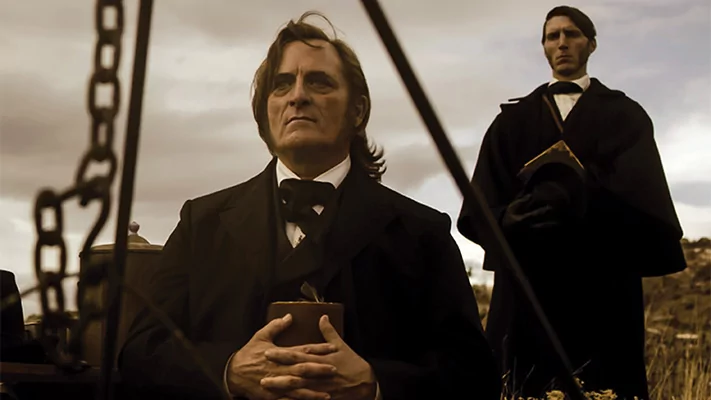What is it about the Wild West that keeps us coming back for more?
Surely the popular appeal of the Western, on the page, on the stage, and on the screen, derives at least in part from prurience — the ever-present blood, guts, and sex on prominent display in an untamed land.
On top of that, it’s that we can’t get enough of the very wildnessness of the natural setting: majestic buttes, unforgiving deserts, soaring escarpments, endless scrubland, and magnificent forests stocked and stalked by wolves, bears, mountain lions, and other ruthless predators.
Manifest destiny plays its part, too, as the struggle between enterprising pioneers and tragic, courageous native tribes ignites nostalgia, at least in some, for a time when Americans were unapologetic conquerors.

These tropes permeate the genre and account in good part for the evergreen popularity of cultural products such as Yellowstone, a series now in its sixth season that has dominated television ratings for years, along with its even more Western-y prequels, 1883 and 1923; the enduring charms of the John Wayne-Gary Cooper tradition of the cinematic Wild West; and the transcendent pleasures of the late Cormac McCarthy’s border trilogy, among so many others.
But one critical, often overlooked element of the Western is slightly orthogonal to the holy trinity of gore, nature, and conquest: a morality play involving competing ethical systems playing out against a spectacular backdrop.
This tension between formal law, whether in the form of religion, federal authority, or state governance, and a deeper-set, more primitive code of right and wrong is on prominent display in the latest entry in the Western library: the Netflix series American Primeval, set in 1850s Utah Territory.
Directed by Peter Berg, who’s best known for Friday Night Lights, Deepwater Horizon, and Lone Survivor, the show traces three intertwined storylines originating in the Fort Bridger outpost on the banks of the Blacks Fork of the Green River in what’s now southeastern Wyoming, a spot where federal soldiers, Mormon pioneers, native tribesmen, bounty hunters, and outlaws all converge.
The background storyline centers on Brigham Young (an imposing but joyful Kim Coates, of Sons of Anarchy fame), leader of the Latter-Day Saints Church and governor of the territory, who vies with guns and money to make Utah safe for Mormons by protecting his flock from the persecution of the Army and the depredations of the Shoshone and Paiute tribes. Among other things, Young seeks to purchase Fort Bridger from its eponymous founder, the legendary mountain man Jim Bridger, played wryly by character actor Shea Whigham, who labors to maintain the way of life he built from scratch at an economically and militarily strategic crossroads.
We also encounter a devout young newlywed Mormon couple, Jacob and Abish Pratt, who seek tranquility among their coreligionists in the New Zion but become forcibly separated after a gruesome attack on their camp results in Jacob’s partial scalping and Abish’s abduction by a splinter sect of Shoshones.
And, most affectingly, we meet Sara Holloway, played earnestly by Betty Gilpin, of GLOW fame, and her son Devin fleeing Pennsylvania, where Sara killed her wealthy husband in self-defense, and striving to reunite with Devin’s father across the Wasatch Mountains. To reach him in Crooks Springs, Sara enlists the assistance of a guide named Isaac Reed, depicted by a gritty and valiant Taylor Kitsch, also from Friday Night Lights, who leads their small band in the face of calamities climatic, financial, and violent.
All characters engage in the contest over which legal system deserves preference, first and foremost Young, whose underling informs a settlement of non-Mormons that the governor has “declared martial law to protect his people due to you and your kind driving us out of our homes.” The pioneers swiftly respond that “we have our own proclamation, and that proclamation says that we take orders from no man, especially a goddamn Mormon.” The two sides ultimately work out an uneasy truce but without smoothing out the rough layers of whose law governs a lawless land.
Later, Young himself reveals his incendiary plans for the fort, thundering, “I do what’s required to protect my people, Mr. Bridger. A line must be drawn or else we will cease to exist. And I will not let that happen.” When Bridger protests the illegality of Young’s intentions, the governor retorts, “When evil comes knocking, you lock the door.” In this sense, the Mormon leader purports to advance both the formal law of the land on Utah Territory and more elemental notions of justice — even while simultaneously playing the role of both oppressor and oppressed.
Similarly, in captivity, Abish develops a more nuanced understanding of the relationship between the tribes and the pioneers and both groups’ religious commitments. “Your god tells you to kill the whites?” she boldly asks the charismatic warrior Red Feather. “Whites believe their god tells them to kill you! Perhaps the gods are playing a game with all of us, to see who can kill the most.” Through Abish’s insight, the competing and seemingly irreconcilable claims asserted by the Indians and the settlers come into clear focus.
Likewise, Sara and Devin confront their own lawlessness, with Devin confiding in Reed his misgivings about his mother’s homicidal actions. “Do you feel bad killing men?” he asks the guide. “Not the bad ones,” Reed responds. “I mean, you don’t go to hell for that, do you?” Devin frets. “Me and my mom killed a man.” But Reed reassures the boy that their actions were justified by a deeper law. “You ain’t got to worry about that,” he insists. “Whatever your mother’s done to protect you both, ain’t no sin in that.”
CLICK HERE TO READ MORE FROM THE WASHINGTON EXAMINER
Thus, in Young’s and his followers’ navigation of multiple levels of justice, Abish’s encounter with Native American and white conceptions of rightness, and Sara and Devin’s torment over the ethics of killing, the show presents the vicissitudes of the law in all its complexity, a series-long moral quandary about who and what we should heed — and when. The good guys don’t always win, and we don’t always know who the good guys are.
While engrossing and skillfully executed, American Primeval as a whole winds up somewhat less than the sum of its excellent parts, and its conclusion leaves something to be desired. But as a swaggering Western, the series delivers on all the key performance indicators of the genre — guts, landscape, and history galore — with a thoughtful emphasis on how we negotiate contested notions of the law and of right and wrong, and how we often come up short.
Michael M. Rosen is an attorney and writer in Israel, a nonresident senior fellow at the American Enterprise Institute, and author of the forthcoming Like Silicon From Clay: What Ancient Jewish Wisdom Can Teach Us About AI.























